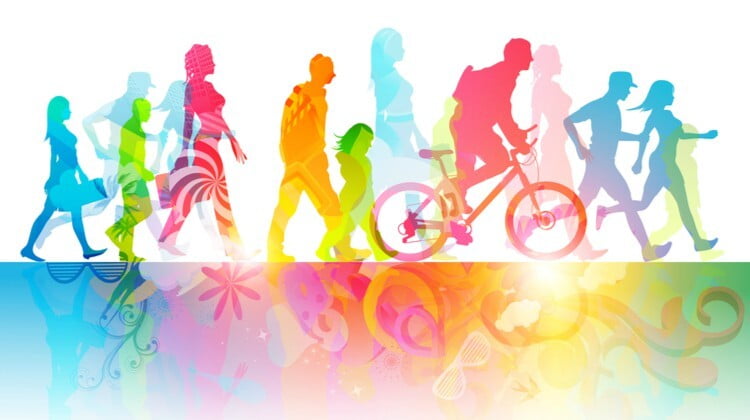
Just the simple act of moving our bodies benefits us in so many ways, both physically and mentally. Usually, when we think of moving for our health, we think of exercise, and exercise can be a huge turn-off to a lot of people, for a lot of reasons.
So, what if we stop trying to exercise? What if we just move more.
Formal exercise used to be the recommendation from physicians and fitness experts. New research and a better understanding of fitness has shown that simple movements like walking, muscle movements, standing, and changing positions throughout the day can provide all the same health benefits and more when compared to working out in a gym for a short period of time then spending the rest of the day being inactive.
How Moving Helps
Moving our bodies every day is important for maintaining our mental health as well as our physical strength. Your mind and body are intimately connected. While your mind is the central control system for your body’s movement, the way you move can and does affect how you think and feel.
Circulation
Moving your body gets your heart beating and your blood flowing. Increasing your blood flow helps feed your cells and removes waste and toxins from your body.
Lymph
The lymphatic system is our body’s way to detoxify, nourish, and regenerate tissue, filter metabolic waste, and keep our immune system functioning properly. In order to work, lymphatic fluid must move through the body. This lymphatic fluid relies on the movement of our muscles in order to circulate.
Energy
Even if it seems counter-intuitive, physical activity delivers oxygen and nutrients to your tissues. When your heart and lungs work more efficiently, you have more energy.
Mood
Physical activity releases “feel good” chemicals in the brain that cause you to feel happier and more relaxed. Moving your body is a simple way to reduce stress, boost your confidence, and clear your mind.
Digestion and Elimination
Moving other muscles around your intestines, like the abdominal muscles, helps to keep them tone and fit, which helps us to stay more regular. Digestive regularity helps our body to rid itself of toxins and maintain a healthy weight.
Mental Health
Physical activity has been proven to be an easy and effective treatment for stress, depression, anxiety, insomnia, ADHD and a wide range of mental health issues. Simple physical activities like walking, yoga, and taking the stairs can be as effective as medications when used with mindfulness and other treatments.
Get Moving!
Walk - Walking is a full body workout, using all the muscles in your legs, the pelvic muscles, abdomen, upper and lower back, shoulders, arms, and neck. You can do it virtually anywhere, and it’s free!
Stand up - Walk or pace while waiting, and stand up while on the phone.
Take the stairs - Climbing stairs uses all the same muscles as walking, and burns more calories per minute than jogging.
Park a little farther away - If you park in an empty spot closest to a store entrance, you might only walk 20 steps to the front door. Parking at the far edge of the can mean you take 200 steps or more.
Lower your stress - Stress puts an incredible strain on your mind and body. Reducing stress frees up energy for moving more and staying healthier. Hypnosis, mindfulness, and physical activity can lower your stress levels and increase your motivation to get moving.
Isometrics are physical exercises in which muscles are caused to act against each other or against a fixed object.
Sit up straight, hold your arms in front of you with your elbows bent. Press your palms together and hold for five seconds, then release. Repeat at least four times.
While sitting, straighten one of your legs so it’s parallel to the floor. Hold the leg extended for a count of 10 then slowly lower it back down. Repeat with the other leg. Alternate between both legs ten times.
Stand with your feet flat on the floor, then rise up onto the balls of your feet. Hold for two seconds, then lower back down. Repeat at least 20 times. This is a great one to do while washing dishes or standing in line.
The Role of Hypnosis
David Spiegel, a psychologist at Stanford, describes hypnosis this way: “You do shift into a different kind of brain function when you go into a hypnotic state,” he says. “It helps you focus your attention so you’re not thinking about other things, you have better control what’s going on in your body, and you’re less self-conscious.”
The power in this is that our heightened suggestibility can allow us to perceive something as either better or worse than it actually is. When we’re in that place of suggestibility, our brains can change our perception of an event based purely on suggestion.
Are you ready to jump start your motivation and get moving?
Schedule your free Strategy Call today!
"Motivation and Abundance”
Get instant access to this powerful custom audio hypnosis program absolutely free!
Abdominal Breathing for Anxiety and Stress Relief
Get this powerful tool to quickly and easily stop stress and anxiety now!